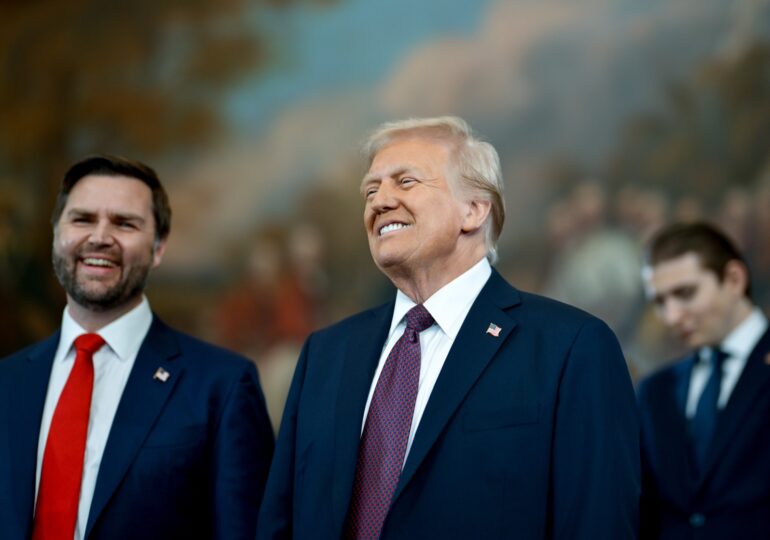President Donald Trump’s second term started off strong, but not necessarily in the way the White House had hoped.
In the first months of governance, a series of administrative mistakes, rushed decisions, and internal scandals have shaken public confidence and fueled opposition criticism. From wrongful deportations and leaks of sensitive information to an unprecedented bureaucratic chaos in key institutions such as the IRS and the Pentagon, the Trump 2.0 administration seems caught in a wave of errors.
In this tense landscape, even some of the most controversial actions of the administration are overshadowed by the confusion generated from within, as CNN highlights in an analysis.
Error after error
An "administrative error" led to the deportation of a man from Maryland, triggering the most visible legal challenge to Trump's deportation policy. The Supreme Court ruled that the administration must "facilitate" the return of Kilmar Abrego Garcia, but the White House made no real efforts to bring him back to the US.
Second gaffe on Signal
It all started with the accidental addition by Trump's national security adviser of a journalist to a Signal chat. This led to the discovery that Defense Secretary Pete Hegseth was sharing sensitive information.
While it seemed that the incident had been resolved, tensions resurfaced at the Pentagon with the removal of Hegseth loyalists, who were still new in their roles. There are now reports that Hegseth shared sensitive data in a second Signal chat.
Letter to Harvard
Sending a letter – probably by mistake – sparked a legal battle with Harvard.
The incident, as reported by The New York Times, was not acknowledged by the White House as a mistake, but administration officials said the letter did not achieve its original purpose, which apparently was not for Harvard to sue the Trump administration.
"The letter was intended to resume negotiations between the parties," said Education Secretary Linda McMahon on CNBC last Tuesday. The letter, signed by three government officials, was legitimate but likely sent prematurely.
IRS, chiefs on a revolving door
The Internal Revenue Service of the United States had several interim chiefs in less than 100 days into Trump's second term. Some resigned in protest after the administration decided to provide tax data to immigration officials.
The most recent acting commissioner, Gary Shapley, an integrity whistleblower, was removed after just a few days, apparently following a complaint from Treasury Secretary Scott Bessent that he was excluded from the process.
Simple math of tariffs
The announcement of retaliatory tariffs was not a mistake, but the panel of figures used by Trump to support his arguments included bizarre values that puzzled economists.
The market reacted positively on Tuesday after The Wall Street Journal reported that Bessent informed investors that the trade war with China "will de-escalate."
The White House sought to reassure markets and the public through a statement from press secretary Karoline Leavitt, stating that the administration has made progress in negotiating new trade deals with 18 countries. The timeline for finalization remains unclear.
How many "errors" make a pattern?
Republican Senator John Kennedy of Louisiana indirectly supported the administration, stating on "Meet the Press" on Sunday that the wrongful deportation of Abrego Garcia was a "blunder," but not indicative of a pattern.
However, a clear pattern of unforced errors is emerging, complicating Trump's already controversial and divisive policies.
The Abrego Garcia case humanized the mass deportation effort, even though his return to the US is unlikely.
The issues with Hegseth's Signal app and the carousel of IRS commissioners highlight that Trump brought in outsiders to the administration to disrupt the federal bureaucracy.
Harvard's lawsuit is welcomed by those concerned about the impact of Trump's plans to cut research funding and constrain universities to limit protests and dissent.
Expected errors of DOGE
Errors seem to be in the DNA of the Department of Governmental Efficiency led by Elon Musk.
"Nobody hits it every time. We will make mistakes, but we will act quickly to correct them," Musk said in the Oval Office in February.
Musk has acknowledged at least one: "One of the things we mistakenly canceled very briefly was Ebola prevention. I think we all want Ebola prevention," he said at a government meeting. However, independent reports question whether the funds were reinstated.
Dismissal, rehiring, re-dismissal
Musk has not acknowledged other DOGE errors, such as the dismissal and subsequent rehiring of government officials in nuclear safety in Texas and electric grid security in the Pacific Northwest.
Other employees were apparently fired randomly under the pretext of performance. Following a decision by a California judge, they could be dismissed again. Trump's efforts to shrink the size of government continue. More agencies are expected to proceed with "personnel reduction" measures.
These are not mistakes, CNN concludes. The intentional actions of the administration may, rather, concern Trump's critics than suggest negligence.

